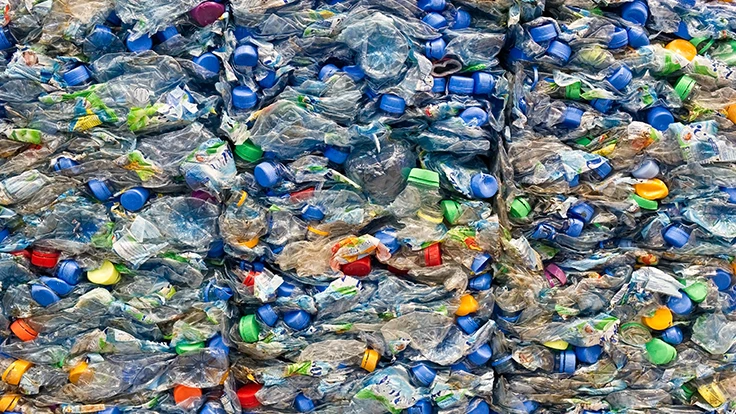
Most Americans have access to recycling programs that accept beverage containers, according to a study commissioned by the Sustainable Packaging Coalition (SPC), Charlottesville, Virginia, with participation from SPI: The Plastics Trade Association, Washington.
The study, “2015-16 Centralized Study on Availability of Recycling for Beverage Containers,” identifies the prevalence of recycling programs that accept beverage containers, including polyethylene terephthalate (PET) bottles, jugs and jars, used aluminum beverage cans (UBCs), glass beverage bottles and cartons. The findings on PET show that 92 percent of the U.S. population can recycle PET bottles, jugs and jars.
“It’s important to make recycling available to consumers. The more convenient we can make recycling for consumers, the more people will recycle,” says George Southworth, director of industry affairs— Rigid Plastic Packaging Group (RPPG) and Pharmaceutical and Medical Device Applications Committee (PMDAC) at SPI. “This study shows many Americans have the resources they need to recycle, so it’s up to us to keep educating and advocating for more effective recycling.”
The study further breaks down the availability of recycling by the type of recycling available and finds that 54 percent of U.S. residents have automatic/universal curbside recycling of PET bottles, jugs and jars. The other curbside programs were opt-in, which is available to 6 percent of the population, and subscription, which is available to 8 percent of the population. In total, 68 percent of U.S. residents have some sort of curbside recycling available, according to the study. Drop-off programs are available to 24 percent of the U.S. population and, when combined with the curbside recycling availability, totals 92 percent of all programs—curbside and its subsidiaries and drop-off programs—available to the U.S. population.
“This new study helps us to make a true assessment of the ease and availability of recycling by consumers across the country,” says Dan Mohs, chairman and CEO of Placon Corp. “This report also serves as a contextual guide for brands who make claims about their recycling and sustainability efforts.”
Founded in 1937, SPI: The Plastics Industry Trade Association promotes growth in the $427 billion U.S. plastics industry. Representing nearly 1 million American workers in the third largest U.S. manufacturing industry, SPI says it delivers legislative and regulatory advocacy, market research, industry promotion and the fostering of business relationships and zero waste strategies.
The study, “2015-16 Centralized Study on Availability of Recycling for Beverage Containers,” identifies the prevalence of recycling programs that accept beverage containers, including polyethylene terephthalate (PET) bottles, jugs and jars, used aluminum beverage cans (UBCs), glass beverage bottles and cartons. The findings on PET show that 92 percent of the U.S. population can recycle PET bottles, jugs and jars.
“It’s important to make recycling available to consumers. The more convenient we can make recycling for consumers, the more people will recycle,” says George Southworth, director of industry affairs— Rigid Plastic Packaging Group (RPPG) and Pharmaceutical and Medical Device Applications Committee (PMDAC) at SPI. “This study shows many Americans have the resources they need to recycle, so it’s up to us to keep educating and advocating for more effective recycling.”
The study further breaks down the availability of recycling by the type of recycling available and finds that 54 percent of U.S. residents have automatic/universal curbside recycling of PET bottles, jugs and jars. The other curbside programs were opt-in, which is available to 6 percent of the population, and subscription, which is available to 8 percent of the population. In total, 68 percent of U.S. residents have some sort of curbside recycling available, according to the study. Drop-off programs are available to 24 percent of the U.S. population and, when combined with the curbside recycling availability, totals 92 percent of all programs—curbside and its subsidiaries and drop-off programs—available to the U.S. population.
“This new study helps us to make a true assessment of the ease and availability of recycling by consumers across the country,” says Dan Mohs, chairman and CEO of Placon Corp. “This report also serves as a contextual guide for brands who make claims about their recycling and sustainability efforts.”
The study was commissioned by the SPC and conducted by Resource Recycling Systems and Moore Recycling Associates. Other project sponsors included the Can Manufacturers Institute, Carton Council, Glass Packaging Institute, National Association for PET Container Resources and The Aluminum Association.
Founded in 1937, SPI: The Plastics Industry Trade Association promotes growth in the $427 billion U.S. plastics industry. Representing nearly 1 million American workers in the third largest U.S. manufacturing industry, SPI says it delivers legislative and regulatory advocacy, market research, industry promotion and the fostering of business relationships and zero waste strategies.
Latest from Recycling Today
- Lautenbach Recycling names business development manager
- Sebright Products partners with German waste management equipment company
- WasteExpo transitions to biennial format for enhanced experiences
- Study highlights progress, challenges in meeting PCR goals for packaging
- Washington legislature passes EPR bill
- PureCycle makes progress on use of PureFive resin in film trials
- New copper alloy achieves unprecedented high-temperature performance
- Gränges boosts profits and sales volume in Q1 2025





